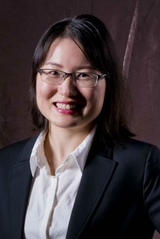
毛伊娜教授
联系电话:025-83621067 通讯地址: 南京市汉口路22号南京大学商学院人力资源管理学系 邮编:210093 电子邮件 :yinamao@nju.edu.cn 系所 :人力资源管理学系 个人简介
南京大学商学院人力资源管理系教授、博士生导师。先后获得中国人民大学学士、香港中文大学硕士及博士学位,其后在香港中文大学及香港大学担任博士后研究员。主要从事职场排斥、情绪、领导力及师徒制方面的研究。
研究方向
1. 职场排斥2. 领导3. 师徒制4. 情绪
教学方向
1. 人力资源管理2. 管理学研究方法3. 组织行为学
教学奖励
1. 毛伊娜,2015,杜厦奖教金,南京大学2. 毛伊娜,2014,本科教学奖三等奖,南京大学商学院
科研奖励
1、南京大学商学院 科研新星奖 2013 2、南京大学商学院 青年骨干教师培养计划 2013
科研项目
1. 主持 自然科学基金青年项目 (2015.01-2017.12) 项目批准号:71402069 项目名称:职场排斥产生原因及其对员工行为影响机制的研究2. 主持 自然科学基金面上项目 (2019.01-2022.12) 项目批准号:71872083 项目名称:基于社会平衡理论的职场排斥互动机制研究
出版专著出版教材发表论文
1.Huang,Y., Mao, Y.*, & Zhang, J. online. Spillover and crossover from workoverload to spouse-rated work-to-family conflict: The moderating role ofcross-role trait consistency. FundamentalResearch. 2.Zhang,I. D., Mao, Y.*, & Wong, C.S. 2023. Potential buffering effect ofbeing a right-hand subordinate on the influence of abusive supervision. Leadership & Organization DevelopmentJournal, 44(1): 72-86. 3.Lan, J., Mao, Y.*, Peng, K. Z., & Wang,Y. 2022. The combined effects of positive and negativeaffect on job satisfaction and counterproductive work behavior. Asia Pacific Journal of Management, 39: 1051–1069. 4.Liu, Y., Mao, Y.*, Lan, J., Wong, C.S.,Peng, K. Z. 2021. Conducting studies on person-centered career interestprofiles: An illustrative example in Hong Kong. Journal of Career Development, 48(4):491-506. 5.Mao,Y., He, J., & Yang, D. 2021. Dark sides of engaging in creativeprocesses: Coworker envy, workplace ostracism, and incivility. Asia Pacific Journal of Management, 38:1261–1281.6.Liu,Y., Mao, Y.,* & Wong, C.S. 2020. Theorizing parental interventionand young adults’ career development: A social influence perspective. (equalcontribution), Career DevelopmentInternational, 25(4): 415-428. 7.毛伊娜,潘然,张伟。构建职场排斥三方互动的理论模型—社会平衡理论的视角,《心理科学进展》,2020, 28(2): 1-15。8.Mao, Y., Wong, C. S.,Tao, X., & Jiang, C. 2018. The impact of affect on organizational justice perceptions:A Test of the Affect Infusion Model. Journalof Management & Organization. 24(6): 893-916. 9.Mao,Y., Liu, Y., Jiang, C., & Zhang, D. 2018. Why am I being ostracized and how would Ireact? --A review of workplace ostracism research. Asia Pacific Journal ofManagement. 35(3): 745-767.10.Wang,Y., Peng, K. Z., Mao, Y., & Lan, J. 2018. Development of a Chinesemeasure on twelve basic emotions and a preliminary test on a two-dimensionalmodel on Emotions-Job outcome relationship. AsiaPacific Journal of Management, 35: 529-564.11.Lan,J., Wong, C. S., Jiang, C., & Mao,Y.* 2017. The effect of leadership on work-related flow: A moderatedmediation model. Leadership & OrganizationDevelopment Journal, 38: 210-228.12.Liu,Y., Peng, K. Z., Mao, Y. *,& Wong, C-S. 2017. Different forms of relationships between vocationalinterests and career maturity in Chinese context. Journal of Career Development, 44: 425-439.13.Mao, Y., Wang, C-W., & Wong, C. S. 2016. Towards aModel of the Right-hand Person. Leadership& Organization Development Journal, 37(4):520-539.14.Mao, Y., Kwan, H. K., Chiu, R. K., & Zhang, X. 2016.The impact of mentorship quality on mentors’ personal learning andwork-to-family interface. AsiaPacific Journal of Human Resources, 54:79-97.15.Mao, Y., Wong, C. S., & Peng, K. Z. 2013. Breakinginstitutionalized corruption: Is the experience of the Hong Kong IndependentCommission Against Corruption generalizable? Asia Pacific Journal of Management, 30(4), 1115-1124. 16.Liu, J., Kwan. H. K., Fu, P. P., & Mao, Y.2013. Ethical leadership and job performance in China: The rolesof workplace friendships and traditionality. Journal of Occupational and Organizational Psychology. 86(4),564-584. 17.Mao, Y., Peng, K. Z., & Wong, C. S. 2012.Indigenousresearch on Asia: In search of the emic components of guanxi. Asia Pacific Journal of Management,29:1143-1168. 18.Liu, J., Kwan, H. K., &Mao, Y.2012. Mentorshipquality and protégés’ work-to-family positive spillover, career satisfaction,and voice behavior in China. InternationalJournal of Human Resource Management, 23: 4110-4128. 19.Wong,C.S., Peng, K.Z., Shi, J., & Mao,Y.2011. Differencesbetween odd number and even number response formats: Evidence from mainlandChinese respondents. Asia PacificJournal of Management, 28: 379-399. 20.Kwan, H. K., Mao, Y.*, & Zhang, H. 2010. The impact of role modeling on protégés’ personallearning and work-to-family enrichment. Journal of Vocational Behavior, 77(2): 313-322. 21.Loi, R., Mao, Y.,& Ngo, H. Y. 2009. Linking leader-member exchange and employee workoutcomes: The mediating role of organizational social and economic exchange. Management and Organization Review,5(3): 401-422. 22.Liu, D., Liu, J., Kwan, H.K., & Mao, Y. 2009. Whatcan I gain as a mentor? Effects of mentoring on job performance and socialstatus to mentors in teams. Journalof Occupational and Organizational Psychology, 82(4): 871-895.
会议与工作论文 |